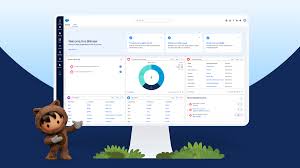Salesforce Agentforce: Redefining Autonomous AI for the Enterprise Salesforce has unveiled Agentforce, a groundbreaking addition to its platform that enables businesses to create and deploy autonomous AI agents capable of performing tasks across any business function. Unlike traditional chatbots or copilots, Agentforce leverages advanced reasoning capabilities to independently resolve customer cases, qualify sales leads, optimize marketing campaigns, and more. By automating actions triggered by data changes, business rules, pre-built automations, or API signals, Agentforce empowers companies like OpenTable, Saks, and Wiley to scale their workforce and enhance customer experiences. “Agentforce is redefining what’s possible in business and beyond,” said Marc Benioff, Chair and CEO of Salesforce. “This technology is ushering in an era of AI abundance and limitless workforces, augmenting employees, building deeper customer relationships, and driving unprecedented growth and profitability.” Built on a Metadata-Driven Architecture Agentforce builds on Salesforce’s metadata-driven platform, ensuring rapid deployment and customization without extensive manual effort. “Agentforce taps into the trusted Salesforce platform, seamlessly integrating enterprise data, workflows, and AI models to deliver actionable intelligence,” said Srini Tallapragada, President and Chief Engineering Officer at Salesforce. Addressing Market Inefficiencies Salesforce research identified significant inefficiencies Agentforce is designed to address: Marc Benioff emphasized, “The agent revolution is as transformative as the cloud, social, and mobile revolutions, setting a new standard for operational efficiency.” Rapid Adoption and Industry Use Cases At Dreamforce 2024, customers created over 10,000 autonomous agents in three days, with adoption accelerating to 20,000 agents globally through Salesforce World Tour events. The platform’s natural language interface enables business users—not just IT teams—to build and customize agents. Industry Applications: Ecosystem and Partner Support The launch is bolstered by partnerships with global systems integrators, including Accenture, Deloitte, IBM, PwC, and Slalom. These collaborations have accelerated emerging technology rollouts by 31%, according to Salesforce. Additionally, the new Agentblazer Community provides a hub for knowledge sharing and integrations via the Salesforce AppExchange. Pricing and Future Development Agentforce is now generally available, with pricing starting at $2 per conversation, including volume discounts. Customers can explore the platform through the Salesforce Foundations trial, offering 1,000 conversation credits for free. Future development plans focus on enabling multi-agent scenarios for complex workflows and expanding autonomous capabilities across business processes. “This is just the first chapter,” said Clara Shih, CEO of Salesforce AI. “The innovation we’ll see from this technology will transform businesses in ways we’ve only begun to imagine.” What This Means for Businesses Agentforce represents Salesforce’s most ambitious platform expansion since Einstein AI’s debut in 2016. Its consumption-based pricing model aligns with Salesforce’s broader shift toward pay-as-you-use services, mirroring strategies with Data Cloud and Einstein GPT. For enterprises, the platform offers a low-risk trial to assess its potential for driving operational improvements. The challenge will be transitioning from pilot projects to large-scale deployments while maintaining the claimed accuracy and efficiency advantages. With over 20,000 agents created and a robust partner ecosystem, Salesforce is well-positioned to lead the autonomous AI revolution. However, the ultimate success of Agentforce will depend on its ability to consistently deliver measurable business value beyond the initial wave of adoption. Like Related Posts Salesforce OEM AppExchange Expanding its reach beyond CRM, Salesforce.com has launched a new service called AppExchange OEM Edition, aimed at non-CRM service providers. Read more The Salesforce Story In Marc Benioff’s own words How did salesforce.com grow from a start up in a rented apartment into the world’s Read more Salesforce Jigsaw Salesforce.com, a prominent figure in cloud computing, has finalized a deal to acquire Jigsaw, a wiki-style business contact database, for Read more Service Cloud with AI-Driven Intelligence Salesforce Enhances Service Cloud with AI-Driven Intelligence Engine Data science and analytics are rapidly becoming standard features in enterprise applications, Read more











